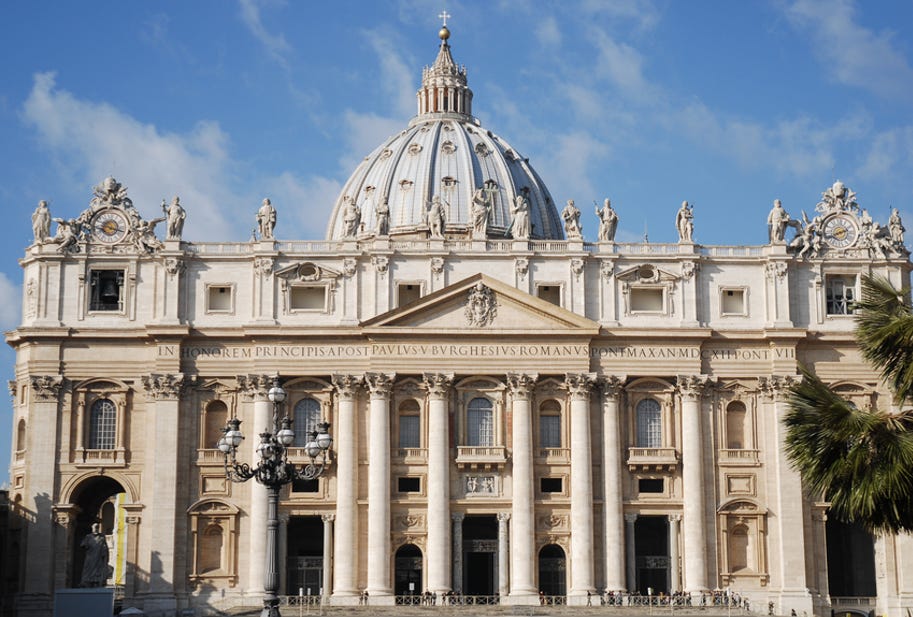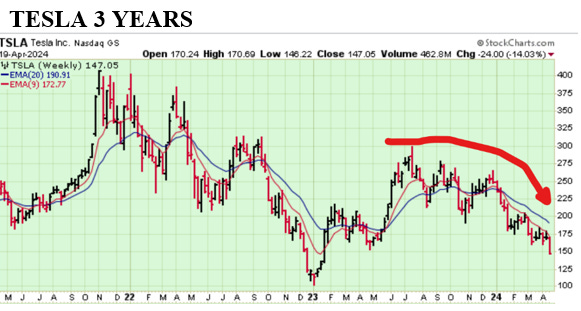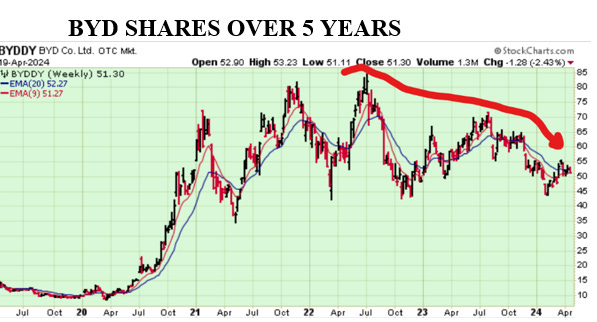Direct from BOOM Finance and Economics at the links below
BOOM Finance and Economics seeks out the very best information from authoritative sources and strives for consistency in its quality and trustworthiness. Over 5 years, BOOM has developed a loyal readership which includes many of the world’s most senior economists, central bankers, their senior advisers, fund managers, and academics. If you want a real edge in understanding the complex world of finance and economics, subscribe to BOOM on Substack or as a Follower on LinkedIn.
BOOM EDITORIAL THIS WEEK

BOOM will attempt to enlighten but cannot guarantee that all is correct in this analysis or that this is a fully comprehensive report. The subject matter, as you will soon discover, is both complex and somewhat surprising. The Motto of the bank is “Money Must Serve Not Rule” – from a statement by Pope Francis in 2013. The bank has only one headquarters location, the Vatican City State. It has 117 employees, and 12,759 clients operating in 112 countries.

This statement begs two questions: Who is the ASIF? What is the Holy See? The ASIF is, in effect, the banking and financial regulator. More on that later. And the Holy See? (Sometimes referred to as the Holy See, other times as the holy See).
The Holy See, also called the See of Rome, the Petrine See, or the Apostolic See is the jurisdiction of the Pope in his role as the Bishop of Rome. It includes the apostolic, episcopal See of the Diocese of Rome, which has ecclesiastical jurisdiction over the worldwide Catholic Church and sovereignty over the city-state known as the Vatican City. As the supreme body of government of the Catholic Church, the Holy See enjoys the status of a sovereign juridical entity under international law.
The Holy See is headquartered in, operates from, and exercises “exclusive dominion” over the independent Vatican City State enclave in Rome, of which the Pope is sovereign. The Holy See is thus viewed as the central government of the Catholic Church. The Catholic Church, in turn, is the largest non-government provider of education and health care in the world.
The Holy See and the Vatican City State are two separate entities. And the Vatican Bank is another entity. It is important to understand the differences between the Vatican City, the Holy See, the Vatican Bank (IOR), and the Catholic Church. The Holy See is the governing body of the Vatican State. If you entered into a contract with the territory, you would do it with the Holy See, in most cases. Vatican City is the physical area where the Holy See resides. [AP adds: “Like the City of London – same thing – and exempt from any jurisdictions whatsoever.]
The Vatican is located within the city of Rome, encompassing 110 acres with a population of under 1,000, which makes it the world’s smallest country. Historically, the Holy See has invested mainly in Italian industries, spreading its portfolio between stocks and bonds, and limiting its stake in companies to less than 6%. It has invested conservatively, choosing to buy and hold proven companies in strong industries; because of this, investments in the developing world are limited.
More recent investments have been international, however, particularly in Western European currencies and bonds, with some activity in the New York Stock Exchange. The Holy See also has investments in real estate around the world, particularly in land and churches. [AP adds: “like Britain’s Royal family which owns one-sixth of global land area]
But the interesting statement the President of the Vatican Bank makes in the 2022 Annual Report is this, referring to previous illegal activities which he describes as “past abuses” in the bank’s operations, “In 2022 the first of the legal proceedings brought by the IOR, both in the Vatican and abroad, to bring justice to the past abuses came to an end. Also on the legal front, the Institute has achieved an important success with the final confiscation and recovery of significant amounts, confirming the will to pursue to the end those who have, in the past, damaged the image of the Institute.”
The Prelate, Battista Mario Salvatore Ricca, follows with his report which also refers to “the specter of the real past disasters [which] always reminds us to keep alert.”
The President of the Board, Jean-Baptiste Douville de Franssu, also made this statement in his report “Ethics has now become a constant focus be it in the way assets are managed or the Institute is run. Customer relationships are more than ever at the heart of all the efforts” and he refers to the “ambition to make the Institute a reliable and ethical partner for the work of religion.”
He goes on to say “Finally, amongst the important achievement of 2022, the Board was pleased to see that 17,229,882 Euros which had been stolen from the Institute before 2014, were recovered after a lengthy legal process. Further successes are expected in 2023 in the fight against past abuses.”
There is certainly no reluctance to admit that the Bank has been poorly managed in the past, before 2022, with illegal, unethical activities. This is, of course, not what you would expect in the Vatican Bank which surely should be a beacon of ethical business practices. In February 2018, the following Press Release was posted by the IOR (Vatican Bank) – PRESS RELEASE
Vatican City State, February 26th, 2018 – “By decree filed with the clerk’s office Registry on February 24, 2018, and served upon the defendants on that date, the Tribunal of the Vatican City State, acting upon the request of the Vatican Promotor of Justice, has summoned to trial a former President of IOR and his legal counsel, charging them with embezzlement and self-laundering. Under such charges, the unlawful conduct was carried out between 2001 and 2008 by, among others, the former General Director, now deceased, and resulted in the disposal of a considerable part of the Institute’s real estate assets. Overall damages have been assessed more than Euro 50 million. The decision of committal for trial was taken at the end of an investigation that has been carried out since 2014 by the Vatican Promotor of Justice, following IOR’s complaint.
This important step shows once again the significant commitment that IOR’s management has undertaken in the last four years to implement strong and transparent governance, which complies with the most rigorous international standards. IOR intends to pursue by civil and criminal judicial proceedings any illicit activity carried out to its detriment, no matter where it occurred and who performed it. In light of the foregoing, the Institute has decided to join a civil action to the criminal proceedings, due to start on March 15, 2018.
Back to the Report: The 2022 Annual Report reveals a Net Profit of almost 29.5 million Euros, the bulk of which was retained. A dividend of 5.2 million Euros was declared and distributed:
- 3 million Euro for the work of religion of his holiness Pope Francis;
- 2 million Euro for the charitable activity of the Commission of Cardinals;
- 200,000 Euro for the charitable activity coordinated by the Prelate of the Institute.
- And, during 2022, a total of 1,139,000 Euro to various charitable causes.

REGULATION OF THE VATICAN BANK – ASIF (the Supervisory and Financial Information Authority) is the Financial Regulator of the Vatican City State with just one “obliged” entity to regulate, the IOR. That seems to be a cosy situation. One Regulator for one Bank.
“The Supervisory and Financial Information Authority (Autorità di Supervisione e Informazione Finanziaria, or ASIF) is also the central institution in the Holy See and Vatican City State that is responsible for the prevention and countering of money laundering, terrorist financing, and the financing of the proliferation of weapons of mass destruction [MAD™] (AML/CFT/CPT).
It is the central authority for supervision and regulation in these matters, both about the obliged entities (i.e. the entities who, due to the activities they carry out, are subject to the obligations set out in the AML/CFT/CPT legislation) and the reporting entities (i.e. entities who, under Vatican law, are required to report suspicious activities).”
About “obliged” entities, there is only one such entity in the jurisdiction – the Istituto per le Opere di Religione (IOR) – while the “reporting entities” consist of every legal entity with a registered office in the Vatican City State and all the Institutions of the Roman Curia.
The Authority also contains the jurisdiction’s financial intelligence unit, which is responsible for acquiring and analysing suspicious activity reports submitted by reporting entities, making use of internal and international collaboration (the Authority is a member of the Egmont Group).
Furthermore, ASIF is also the central authority for the supervision and prudential regulation of entities that professionally carry out financial activities (to date, exclusively the Istituto per le Opere di Religione (IOR). The ASIF is located in Palazzo San Carlo, Vatican City. The ASIF’s 2022 Annual Report states:
“The Vatican’s Supervisory and Financial Information Authority publishes its annual report for the fiscal year 2022, detailing the ASIF’s efforts to increase financial transparency through active participation in MONEYVAL and Egmont programs, as well as international information sharing to prevent tax evasion.
One hundred twenty-eight cases of suspicious activity reports were received in 2022, 124 from the Institute for the Works of Religion (IOR) alone, some of which led to five suspensions. Nineteen reports were forwarded to the Vatican’s Office of the Promoter of Justice. Sixty-seven international memoranda of understanding signed, the latest with North Macedonia and the Cayman Islands.”
BOOM notes 128 cases of “suspicious activity” per year. That is equivalent to one case report every three days. BOOM wonders if that is normal for such a small financial institution as the IOR. According to its annual report, the Vatican’s Supervisory and Financial Information Authority (ASIF) was established by Pope Benedict XVI in 2010 to combat money laundering, terrorist financing, and financial intelligence.
Further, the report states “In 2022, the pandemic, though less virulent, had knock-on effects into the following year as well. It was joined by the war in Ukraine and the emergence of a banking crisis.” BOOM asks: what banking crisis? This begs the next questions. What is MONEYVAL? What is Egmont?
MONEYVAL is the Committee of Experts on the Evaluation of Anti-Money Laundering Measures and the Financing of Terrorism. It is a permanent monitoring body of the Council of Europe with 35 member states and jurisdictions out of which 32 are assessed exclusively by MONEYVAL.
Two non-member states of the Council of Europe are also members (Israel and the Holy See), as well as several territories for whose international relations for the United Kingdom is responsible (the United Kingdom Crown Dependencies of Guernsey, the Isle of Man and Jersey; as well as the United Kingdom Overseas Territory of Gibraltar).
MONEYVAL holds regular meetings with ministers and high-level officials to take decisive action to improve the effectiveness of measures to combat money laundering, and the financing of terrorism (and proliferation) and to agree on direction and future strategic priorities.
MONEYVAL is a partner with the World Bank and the International Monetary Fund, with representatives from both institutions participating in its plenary meetings. The United Nations Office on Drugs and Crime (UNODC) also regularly sends representatives to MONEYVAL’s plenary meetings, and the Organisation for Security and Co-operation in Europe (OSCE) is a permanent observer to the Committee.
The Egmont Group of Financial Intelligence Units (FIUs) is a global organisation that facilitates and prompts the exchange of information, knowledge, and cooperation amongst member FIUs.
The Egmont Group provides FIUs with a secure platform to exchange expertise and financial intelligence to combat money laundering, terrorist financing, and associated predicate offences. The Egmont Group was formed in 1995 as an informal network of 24 national FIUs, taking its name from the Egmont Palace in Brussels where the group’s founding meeting took place. It is headquartered in Ottawa, Ontario, Canada.
The US Treasury Department defines an FIU as “a central, national agency responsible for receiving (and, as permitted, requesting), analysing and disseminating to the competent authorities, disclosures of financial information: concerning suspected proceeds of crime and potential financing of terrorism, or required by national legislation or regulation, to counter money laundering and terrorism financing.
Regulatory framework of the IOR (Vatican Bank) – from the Annual Report 2022. The Institute is subject to the laws and regulations of the Holy See and Vatican City State as well as to its Statutes. The Vatican’s legal framework recognises Canon Law as the primary source of legislation and the primary criterion for its interpretation. Furthermore, there are six organic laws and other ordinary laws specific to the Vatican City State.
For matters not covered by Vatican laws, the laws and other regulations issued by the Italian Republic are observed as supplementary, subject to prior approval by the competent Vatican authority. they are adopted on the condition that they do not conflict with the doctrine of Divine Law, the general principles of Canon Law, or the provisions of the Lateran Pact and subsequent Agreements, and provided that they apply to the state of affairs existing in Vatican City State (See Law no. LXXI on the source of law, promulgated by Pope Benedict XVI on 1 October 2008).
According to article 1.4 of Law no. LXXI on the sources of law, the legal framework must also conform to the general norms of international law, and to those arising from treaties and other agreements to which the holy See is party.
Taxable income – The IOR financial statements do not report a provision for taxes as there is no tax levy on operating profits of the Vatican City State. Regarding the real estate properties (No. 3) owned by the Institute in Italy, detailed in Section 2 paragraph 3, the IOR files tax returns in Italy and pays the corresponding taxes (IReS and Imu).
FATCA – Since 2015, the Institute has been subject to FATCA, a US federal law that requires foreign financial institutions to report to the US Internal Revenue Service (IRS) the details of accounts held by US clients.
Tax agreement with Italy – Since 2016, the Institute has been implementing the “Agreement between the Government of the Republic of Italy and the Holy See on tax matters”. By the Agreement, clients resident in Italy for tax purposes may fulfil their tax obligations, arising from the possession of financial assets held at the Institute, through a tax Representative chosen by the Institute. The IOR provides the calculations and withholds taxes from customers, which are then paid to the Italian Government through the Italian tax Representative.
Taxation of other countries – For customers who are non-residents in Italy, the principles of international tax law are applied. This means that each customer must declare his or her holdings and all derived income in his or her country of tax residence according to the laws of that country.
KEY FACTS — THE ANNUAL REPORT VATICAN BANK (IOR) 2022 – The Bank has 12,759 clients. Total Client Assets amount to 5.2bn Euros.
- Customer deposits amounted to 1.8bn Euros.
- Return on Equity was 5.4%
- Return on Assets was 1.1%
- Total Assets = 2.7bn Euros (approx)
- Capital as Equity = 300 million Euros
- Cash on Hand = 15 million Euros
- Loans to Customers = 700 million Euros (approx)
- Tangible Assets = 2.4 million Euro
- Intangible Assets = 2.8 million Euros
- Investments in Subsidiaries = 15.8 million Euros
- Other Assets = 87.6 million Euros (approx)
The major assets held as “Other Assets” include Gold (31.664 million Euros), mainly deposited with the US Federal Reserve, while medals and precious coins (10.720 million Euros) are kept in the IOR vaults. Gold is carried at a lower of cost or net estimated recoverable amount.
Investment in subsidiaries consists of the stake in the wholly-owned real estate company S.G.I.R. S.r.l., based in Rome, Via della Conciliazione. Investment in subsidiaries is carried at cost, less impairment. The principal assets of this company are real estate properties.
Investment properties are properties directly owned by the IOR. These are buildings not owner-occupied. They were inherited and held to generate rental income, capital appreciation or both.
Intangible assets correspond to computer software licenses and expenses related to their implementation.
Net Income from Financial Operations = 33.8 million Euros (approx). Operating Costs = 4.356 million Euros (approx). Net Profit = 29.58 million Euros (approx)
The Cash Flow Statement reveals: Cash on Hand at the beginning of 2022 = 16.16 million Euros, Cash on Hand at the end of 2022 = 15 million Euros
Independent Auditors are Mazars, Rome.
Future Plan of Operation IOR – In 2023, the Institute will continue to operate by the Strategic Plan 2021-2025 approved by the Board of Superintendence, positioning IOR as the financial institution of reference for the Catholic community worldwide.
BOOM is not a professional accountant. However, it is fair to say, after examining the Annual Report of 2022, that the Vatican Bank (IOR) is, by international comparisons, a rather small financial institution. It is certainly not “in control of the global financial system” by any stretch of the imagination.
There appear to have been some (possibly illegal) irregular activities before 2022 which caused the bank to take steps to recover what it refers to as “stolen” funds”. The President of the Board has been very open in stating what has transpired and admits that they are chasing yet more (possibly stolen) funds:
“Finally, amongst the important achievements of 2022, the Board was pleased to see that 17,229,882 Euros, which had been stolen from the Institute before 2014, were recovered after a lengthy legal process. Further successes are expected in 2023 in the fight against past abuses”.

VATICAN BANK, THE IMF, BLACKROCK, VANGUARD DO NOT CONTROL THE GLOBAL FINANCIAL SYSTEM – In various editorials, BOOM has now closely analysed the Vatican Bank, the IMF (International Monetary Fund), and the activities of the fiduciaries Blackrock and Vanguard. Long-term BOOM readers can reach a similar conclusion to BOOM. These institutions do not “control the global financial system”, despite commonly held beliefs that they each do. On 24th March 2024 – the BOOM editorial dealt with these matters.
“MOST NATIONS ARE NOT “MASSIVELY INDEBTED TO THE IMF” – THE FACTS MATTER — IMF DEBTS ARE SMALL — IF THE BANKERS DON’T CONTROL OUR WORLD – WHO DOES? On 28th May 2023 —BLACKROCK AND VANGUARD – THE MYTHS SHATTERED – Readers can search the BOOM archives on Substack for a review of those articles [AP notes: …if you can be bothered or why not trust a truthful source?]
TESLA AXES 10% OF THE GLOBAL WORKFORCE

Last week, the CEO of Tesla, Elon Musk, sacked 10% of Tesla staff worldwide (by email). This affects up to 14,000 salaried workers. The source was an internal company-wide email sent to employees by Musk and seen by media outlets. Workers affected by the layoffs received a separate email from Tesla sent to their email address telling them their roles had been eliminated.
“Effective now, you will not need to perform any further work and therefore will no longer have access to Tesla systems and physical locations” the email read. Here is the text of the first email:
“Over the years, we have grown rapidly with multiple factories scaling around the globe. With this rapid growth, there has been duplication of roles and job functions in certain areas. As we prepare the company for our next phase of growth, it is extremely important to look at every aspect of the company for cost reductions and increasing productivity. As part of this effort, we have done a thorough review of the organization and made the difficult decision to reduce our headcount by more than 10% globally. There is nothing I hate more, but it must be done. This will enable us to be lean, innovative, and hungry for the next growth phase cycle.
“I would like to thank everyone who is departing Tesla for their hard work over the years. I’m deeply grateful for your many contributions to our mission and we wish you well in your future opportunities. It is very difficult to say goodbye. For those remaining, I would like to thank you in advance for the difficult job that remains ahead. We are developing some of the most revolutionary technologies in auto, energy, and artificial intelligence. As we prepare the company for the next phase of growth, your resolve will make a huge difference in getting us there.”
During Monday’s trading, Tesla shares were hit hard by the news and fell to just above key support levels of around $160. However, they continued to slide during the week. At the end of the week, they were down by 14%.



Yahoo Finance reported that a well-known Tesla bull, Dan Ives at Wedbush Securities, said this recently about the staff layoffs “This is an ominous signal that speaks to tough times ahead for Tesla as Musk navigates this Category 5 storm, demand has been soft globally, and this is an unfortunate necessary move for Tesla to cut costs with a softer growth outlook.”
STOCK WEAKNESS – BOOM has been warning readers about the dramatic weakness in alternative energy stocks since 10th September 2023 in the Editorial “ALTERNATIVE ENERGY — HYPE HOPE OR GLORY? — COMMERCIALLY VIABLE OR NOT?
BOOM has also previously warned readers specifically about weakness in electric car stocks in the Editorial from 11th November 2023. Again, if readers wish, they can read those articles in the BOOM archives at Substack.
VOLKSWAGEN MOVES BACK FROM ELECTRIC CARS – EV DEMAND COLLAPSING IN EUROPE. In the 11th November editorial last year, BOOM wrote, “The modern electric car industry is now (again) plagued by significant uncertainties. Here is just a few that spring to mind — insufficient recharging stations, range anxiety, increasing insurance costs, uncertain battery life, battery replacement costs, battery weight, increased tyre wear, high initial purchase prices, uncertain resale prices, inadequate model choice, mineral consumption, electromagnetic field radiation from the batteries (EMF) and its long term health consequences and, last but not least, the base energy source used to provide the electricity to charge the batteries (e.g. coal, gas, oil, nuclear, solar, wind etc).”
Last week, on 10th April, the Telegraph in London had a lead article titled “Volkswagen electric car sales plunge as Europe returns to petrol. Demand for EVs falls by 24% amid high energy prices and rollback of subsidies”. “Sales of Volkswagen electric cars have plunged by almost a quarter in Europe as demand for battery-powered vehicles stalls and buyers return to petrol.
Electric vehicle (EV) sales fell by 24% in the first three months of the year as high inflation and rising energy prices dampened demand.” “Volkswagen had been impacted by the axing of subsidies for EV sales in Germany. The EU has also frozen emissions targets for vehicle fleets, stunting sales. Mercedes-Benz on Wednesday also reported an 8% drop in EV sales, blaming the abrupt end of a tax incentive in Germany”.
The Chinese company, BYD, is being touted as the “Tesla Killer”. Sales figures suggest that this may well be the case. BYD’s global sales numbers have recently begun to exceed those of Tesla. However, BYD’s shares are currently in the same pattern of downtrend over the last two years.

BOOM’s QUANTITATIVE BOOSTING FOR THE PEOPLES MONEY EXPLAINED: https://boomfinanceandeconomics.wordpress.com/2019/12/15/boom-as-at-15th-december-2019/ AND BOOM’s Perfect Economy: https://boomfinanceandeconomics.wordpress.com/2020/01/18/boom-as-at-19th-january-2020/
COMING NEXT:
- The Financial Jigsaw Part 2 – RESISTANCE – Saturday, April 27, 2024
- BOOM Weekly Global Review – Tuesday, April 30, 2024
- Letter from Great Britain – CRIMES AGAINST HUMANITY – Saturday, May 4, 2024 – (Andrew Briden MP)
In economics, things work until they don’t. Make your conclusions and do research. BOOM does not offer investment advice.
CLICK HERE FOR PODCASTS: OUR BRAVE NEW ECONOMIC WORLD
BANKS DON’T TAKE DEPOSITS, THEY BORROW YOUR MONEY: LOANS CREATE DEPOSITS — this is how almost all new money is created in the economy (by commercial banks making loans). https://www.bankofengland.co.uk/quarterly-bulletin/2014/q1/money-creation-in-the-modern-economy. Watch the short 15-minute video and see Professor Richard Werner brilliantly explaining how global banking systems work.
In 2014, Richard Werner provided the first empirical evidence that banks create credit out of thin air. They do this whenever they issue a loan or, more specifically, purchase a promissory note. This is a walk-through of exactly how they do it.
Many economists are unaware of this and even ignore the banking & finance sectors in their econometric models.
DISCLAIMER: All content is presented for educational and/or entertainment purposes only. Under no circumstances should it be mistaken for professional investment advice, nor is it at all intended to be taken as such. The commentary and other contents simply reflect the opinion of the authors alone on the current and future status of the markets and various economies. It is subject to error and change without notice. The presence of a link to a website does not indicate approval or endorsement of that website or any services, products, or opinions that may be offered by them.
Neither the information nor any opinion expressed constitutes a solicitation to buy or sell any neither securities or investments. Do NOT ever purchase any security or investment without doing your own and sufficient research. Neither BOOM Finance and Economics.com nor any of its principals or contributors are under any obligation to update or keep current the information contained herein. The principals and related parties may at times have positions in the securities or investments referred to and may make purchases or sales of these securities and investments while this site is live. The analysis contained is based on both technical and fundamental research.
Although the information contained is derived from sources that are believed to be reliable, they cannot be guaranteed.
Disclosure: We accept no advertising or compensation, and have no material connection to any products, brands, topics or companies mentioned anywhere on the site.
Fair Use Notice: This site contains copyrighted material the use of which has not always been specifically authorized by the copyright owner. We are making such material available in our efforts to advance understanding of issues of economic and social significance. We believe this constitutes a ‘fair use’ of any such copyrighted material as provided for in section 107 of the US Copyright Law. By Title 17 U.S.C. Section 107, the material on this site is distributed without profit. If you wish to use copyrighted material from this site for purposes of your own that go beyond ‘fair use’, you must obtain permission from the copyright owner.







So the Vatican Bank is saying they are on the up and up now and there will be no more money laundering. Sure, pull the other one.
Operation Gladio : the unholy alliance between the Vatican, the CIA, and the Mafia
https://archive.org/details/operationgladiou0000will
Thanks, Mary, a salutary reminder! 🙂
Just like they said they would punish pedophile priests and then just moved them to another parish!
Subaru is now finally selling a Tacoma like pickup truck (the Brat) in the USA for $10,000! That will kick the asses of the Evil American Car Empires that are only producing the $60,000 beastly trucks almost nobody has wanted for years; ref Youtube
Subaru Ceo Announces NEW $10,000 Pickup Truck & STUNS The Entire Car Industry!
The old Brat was a small pickup. Seem to remember that it had two removable hard plastic seats in the bed.
It was more like an El Camino.
A GL wagon with a bed and 2 jump seats in the bed.
So is it the Catholics or the Jews “Controlling the Global Financial System”? Or are they in league with each other?
It’s Jews controlling the Catholic Church. That’s why there’s so much pedophilia. Christians should get a clue, who wrote the script.
The tribe controls central banking, mainstream media, big pharma-big agri, Capitalism and Communism, and mainstream religion. Wake up already.